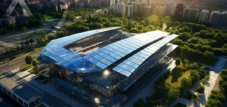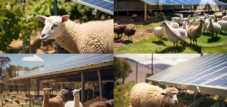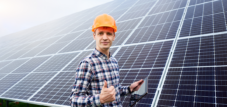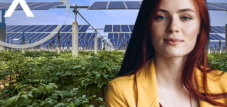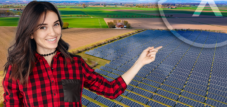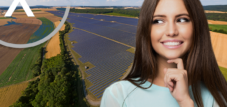Handewitt Agriculture under solar parks: Solar modules provide 40 times more energy than corn on the same area
Language selection 📢
Published on: December 12, 2023 / update from: December 12, 2023 - Author: Konrad Wolfenstein
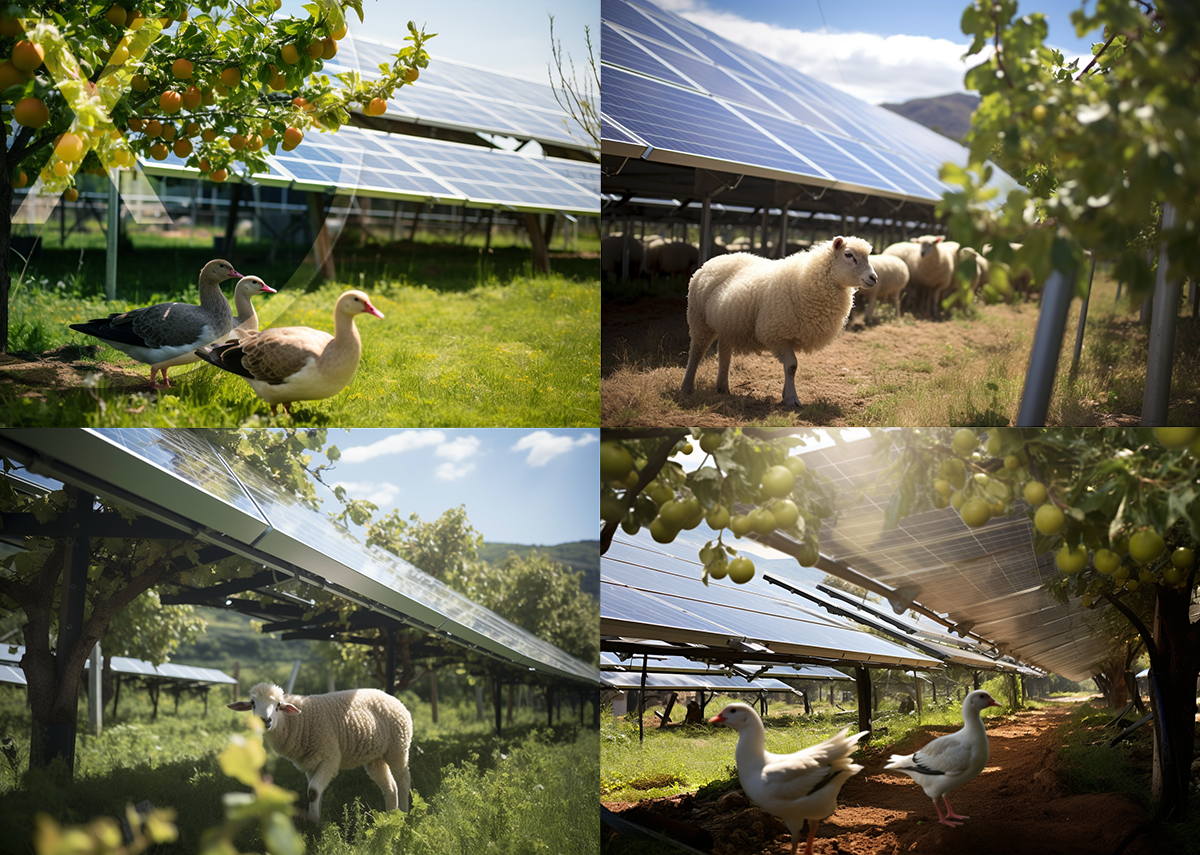
Compared to corn, solar modules deliver 40 times more energy on the same area - Image: Xpert.Digital - AI & XR 3D Rendering Machine
Agri-PV in Handewitt: A model for sustainable energy and agriculture
🏆😎 The advancing climate crisis presents us with the challenge of finding new ways to meet our energy needs without abusing our earth's limited and vital space. In this context, an innovative approach is developing in Handewitt, on the border with Denmark, which harmoniously combines two seemingly opposing land uses: agriculture and energy production through solar power.
🥕🌱 Regional land use was once heavily influenced by agriculture, especially the cultivation of corn for biogas plants. But times are changing, and so a pioneering project is being created in the Schleswig-Flensburg district, which is groundbreaking due to its sustainable dual use of space. Gerd Kämmer, a committed representative of the municipality of Handewitt, is pushing the idea of so-called agri-photovoltaics (agri-PV) as a nature conservation officer and is convinced that a loss of agricultural land does not have to be inevitable.
⚡️📏 In a remarkable move, the municipality of Handewitt has decided to introduce a quota of 20 percent for agri-PV on all future solar park areas. This means that the newly installed solar modules must be installed in a minimum proportion of 20 percent at a level that allows under-management through agricultural activities. Instead of conventional maize cultivation, the sandy geest areas typical of the region could be used again for food production or to promote biodiversity.
☀️🐝 The advantages of this dual use are complex. Photovoltaic systems can generate many times more energy than corn, while at the same time maintaining the use of land for agricultural purposes. In addition, higher solar modules provide additional living space for the local flora and fauna. A living space is created in which agriculture and nature conservation join hands, supported by technology that paves the way to a sustainable future.
👍🏻 This innovative concept found its way into the decisions of the municipality of Handewitt. She proved to be a pioneer by establishing a clear regulation for future solar projects. Building on this commitment, the expansion of ground-mounted solar systems to 350 hectares is planned within the next few years. This project is generating great interest among investors, who are now in a position to demonstrate their willingness to implement these environmentally oriented investment criteria.
✒️ Mayor Thomas Rasmussen recognizes the strategic advantage of this location and emphasizes the municipality's strong negotiating position. However, the newly introduced quota is not equally popular with every investor as it involves increased initial investments. The higher frames of the PV systems mean additional costs, which, however, seem justified in the light of the long-term benefits for ecology and the common good.
⏳ By setting a quota for agri-PV at an early stage, Handewitt not only secures its agricultural land, but also plays a crucial role in the energy transition and environmental protection. This project could serve as a pioneering model for other municipalities, both nationally and internationally.
🌎 It's just one example of how careful use of our resources and an openness to innovative concepts lead to a future in which renewable energy and sustainable agriculture go hand in hand. Handewitt's vision could therefore make a valuable contribution to the necessary transformation of our energy systems and land use methods - a vision that exemplifies how concrete and fruitful the path to a more sustainable future can be.
📣 Similar topics
- 🌍🌱 Agri-PV: Handewitt's sustainable future
- 🌞🚜 Solar power connects agriculture: Handewitt's innovative strength
- 💡🌾 Agri-PV in Handewitt: pioneering project for sustainable energy
- 📣👨🌾 Handewitts Agri-Photovoltaics: Community pioneering role
- ☀️🔋 Handewitt: Push for an environmentally friendly energy transition
- 🚀🌱 Future patterns: Sustainability and Agri-PV in Handewitt
- 🌄🌿 Handewitts Agri-PV: An example of sustainable land use
- 🌎🔄 Agri-PV and agriculture: Handewitt's groundbreaking solution
- 🌱🔆 Agri-photovoltaics: Handewitt's role model for a sustainable future
- 🍃🌞 Energy and nature in harmony: Handewitt as a pioneer
#️⃣ Hashtags: #AgriPhotovoltaics #SustainableEnergy #Agriculture #Environmental Protection #Energy Transition
Plan your solar system for the most common applications conveniently online with our solar system planner!
With our user-friendly solar system planner you can plan your individual solar system online. Whether you need a solar system for your home, your business or for agricultural purposes, our planner offers you the opportunity to take your specific requirements into account and develop a tailor-made solution.
The planning process is simple and intuitive. You simply enter relevant information. Our planner takes this information into account and creates a tailor-made solar system that meets your needs. You can try out different options and configurations to find the optimal solar system for your application.
Additionally, you can save your plan to review later or share with others. Our customer service team is also available to answer your questions and provide support to ensure your solar system is optimally planned.
Use our solar system planner to plan your individual solar system for the most common applications and advance the transition to clean energy. Start now and take an important step towards sustainability and energy independence!
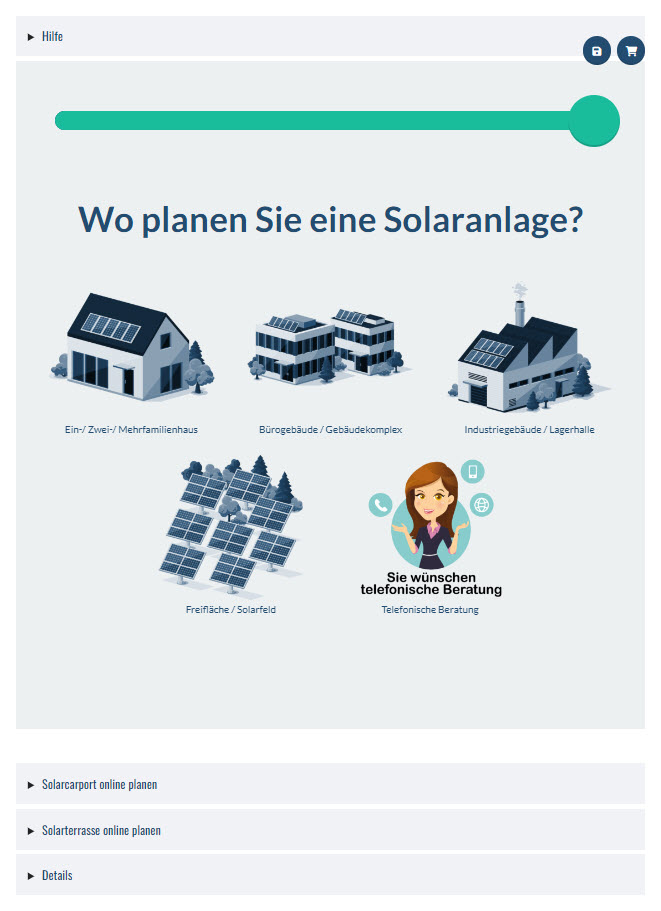
The solar system planner for the most common applications: Plan the solar system online here - Image: Xpert.Digital
More about it here:
🌞🌱🏗️ Solar parks in Germany: Overcoming approval procedures, financing and integration into the grid
👥🏞️ The construction of solar parks presents companies in Germany with numerous challenges, ranging from legal framework conditions to economic aspects to technical and planning requirements. Despite the growing recognition of renewable energies and the increasing demand for clean energy, project developers complain about a variety of obstacles that lead to delays in the implementation of solar park projects.
🔢 Legal approval procedures 📋
In the legal area, the approval procedures for solar parks are complex and lengthy. They require thorough review by various authorities, which often leads to delays. Building permits must be obtained, environmental impact assessments must be carried out and, if necessary, landscape protection interests must be taken into account. In addition, there are strict requirements in Germany with regard to nature conservation. For example, the presence of protected species in potential solar farm areas can significantly slow down or even prevent the development process.
💰📉 Economic aspects 📊
Economic aspects also play a crucial role. Although the cost of solar panels has fallen in recent years, financing large-scale projects remains a challenge. The initial investment costs in particular are high and require reliable financing partners. While support programs and subsidies can be supportive, their availability and the associated conditions are often difficult to predict and can change with political changes.
🔌 Energy grid integration 🗄️
Another critical point is the integration of solar parks into the existing energy network. The fluctuations in energy production through photovoltaic systems must be balanced out because solar radiation varies. This requires intelligent power grids and storage solutions to ensure a stable flow of energy. This need to invest in grid infrastructure and storage technology adds additional complexity and costs to the project.
🧑🔬📐 Technical challenges 🧰
Technical challenges should also not be neglected. The planning and construction of solar parks requires a high level of specialist knowledge. Locations must be found that not only receive enough sunlight, but are also connected to the power grid and meet legal and technical requirements. A suboptimal layout or inefficient orientation of the solar panels can significantly reduce the efficiency of the solar park.
📈 Improved policy framework
Looking ahead, improved political support and simplification of approval procedures are needed to accelerate the development of solar parks. Implementing more effective support measures and strengthening research into innovative technologies could help to further reduce costs and facilitate integration into the energy grid.
⏩ Overcoming obstacles
Project developers of solar parks in Germany face a number of challenges, ranging from bureaucratic processes and financial obstacles to technical requirements. These obstacles are delaying the expansion of solar energy generation, even though it plays a key role in the energy transition. A strengthening and standardization of legal frameworks, a reliable funding policy and investments in technologies are necessary to overcome these hurdles and pave the way for a more sustainable future.
🤝 Increase social acceptance 👥
For the further development of solar energy, it is also essential that social acceptance of large-scale projects such as solar parks is increased. Intensive communication and participation of the local population is required in order to create understanding for the need for such systems and to reduce resistance. Involving citizens in the planning processes or offering citizen participation in solar parks can promote trust and strengthen the local economy.
🏡🥗 Applied Agriculture 🚜
In order to further increase acceptance, innovative approaches are increasingly being pursued, such as the construction of agri-photovoltaic systems that combine agriculture and solar energy production. The advantage of these systems is that they increase the efficiency of agricultural land by using the space above the plants for photovoltaics. This can support farmers economically and at the same time enable clean energy production.
🌐 Expansion lines 📡
Expanding solar energy infrastructure is another hurdle that must be overcome. New solar parks require an appropriate connection to the power grid. Grid bottlenecks and a lack of transmission capacity are often a limiting factor for the expansion of solar energy. Investments in more powerful and intelligent power grids are therefore essential in order to reliably feed the increasing share of renewable energies into the power grid.
🗄️ Storage options ⚡
The further development of storage technologies is also crucial. Battery storage, power-to-gas systems and other storage options must be further developed and made more economically attractive so that they can ensure reliable storage of fluctuating solar energy. Research and innovation also play an important role here - novel storage methods such as solid-state batteries or improvements to existing lithium-ion technologies could significantly increase efficiency and storage capacities.
📶 Smart power grids 🧑💻
Furthermore, digitizing the energy industry is an essential tool to handle the complexities of managing solar energy production, storage and distribution. Smart grids, i.e. intelligent power networks that enable bidirectional communication, are essential for optimally controlling the flow of energy and efficiently integrating systems such as solar parks into the overall system.
🌏 Political framework conditions 📰
A stable and forward-looking energy policy is of great importance for the future of solar projects. Long-term oriented strategies and clear political signals are required to give investors security and to advance the expansion of solar energy. Climate policy objectives, such as those set out in the Paris Agreement, must be consistently implemented at the national level in order to create the necessary framework.
📣 Similar topics
- 🌞 Obstacles and potential: solar parks in Germany
- 🔮 The future of solar energy: challenges and solutions
- 📊 From planning to implementation: The reality of solar park projects
- 📜 Legal hurdles and economic aspects of solar parks in Germany
- 🛠️ The integration of solar parks into the energy grid: Technical requirements
- 🌍 Solar parks in Germany: opportunities, hurdles and perspectives
- 💰 Economic viability and financing of solar park projects
- 🚜 Innovative approaches in solar energy: Agri-photovoltaics and social acceptance
- 🔋 Infrastructure and storage technologies: Challenges for solar energy expansion
- 📈 Energy policy and solar energy: setting the course for the future
#️⃣ Hashtags: #solar parks #renewableenergies #energyinfrastructure #solarenergy #energypolicy
We are there for you - advice - planning - implementation - project management
☑️ Expert advice on energy-efficient renovation and new construction
☑️ with solar solutions and heat pumps/air conditioning systems
I would be happy to serve as your personal advisor.
You can contact me by filling out the contact form below or simply call me on +49 157 30 44 9 555 .
I'm looking forward to our joint project.
Xpert.Digital - Konrad Wolfenstein
Xpert.Digital is a hub for industry with a focus on digitalization, mechanical engineering, logistics/intralogistics and photovoltaics.
With our 360° business development solution, we support well-known companies from new business to after sales.
Market intelligence, smarketing, marketing automation, content development, PR, mail campaigns, personalized social media and lead nurturing are part of our digital tools.
You can find out more at: www.xpert.digital - www.xpert.solar - www.xpert.plus
🎯🎯🎯 Benefit from Xpert.Digital's extensive, fivefold expertise in a comprehensive service package | R&D, XR, PR & SEM

AI & XR 3D Rendering Machine: Fivefold expertise from Xpert.Digital in a comprehensive service package, R&D XR, PR & SEM - Image: Xpert.Digital
Xpert.Digital has in-depth knowledge of various industries. This allows us to develop tailor-made strategies that are tailored precisely to the requirements and challenges of your specific market segment. By continually analyzing market trends and following industry developments, we can act with foresight and offer innovative solutions. Through the combination of experience and knowledge, we generate added value and give our customers a decisive competitive advantage.
More about it here:
Industrial & B2B Business Metaverse: Reduce costs with XR technology for photorealistic product images (XR 3D rendering machine)
XR technology offers a superior solution for creating photorealistic images and allows companies to free themselves from the expensive fees of external media agencies. It is common knowledge that media agencies charge high costs to create such images as it requires expertise, special software and collaboration with various experts.
More about it here:









